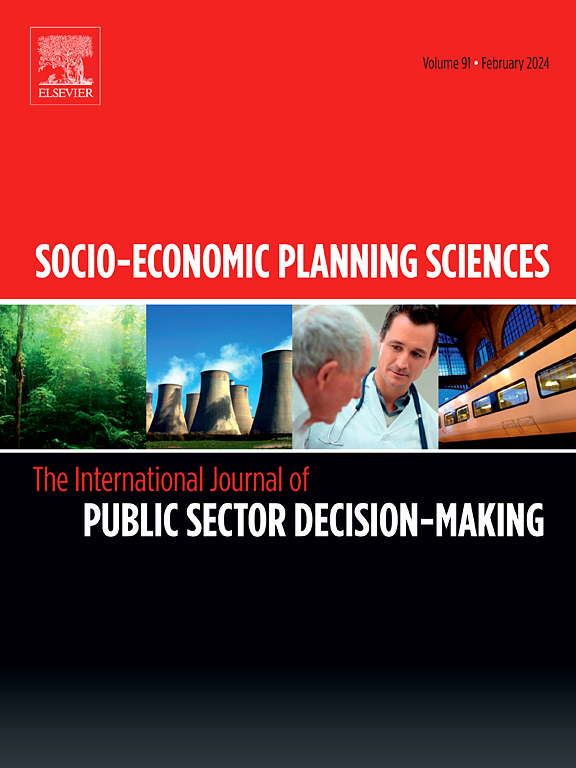What is the difference between specialisation and diversity in hospitals? Investigating their relationship with efficiency
IF 5.4
2区 经济学
Q1 ECONOMICS
引用次数: 0
Abstract
The relationship between hospital specialisation and efficiency is crucial for managing hospital services. We discuss hospital specialisation as a specific instance of the more general concept of diversity and the conceptual opposite of variety. Unlike prior studies that focus on specialisation measures without a theoretical background, we employ the Blau Index, based on the concept of variety, enabling us to assess diversification's impact on efficiency.
We apply the non-parametric meta-frontier approach to a sample of Italian hospitals from 2000 to 2019 in a two-stage analysis. In the first phase, we employ Data Envelopment Analysis (DEA) to evaluate healthcare efficiency. In the second phase, we use bootstrap truncated regression to explore the impact of hospital specialisation and various organisational factors on efficiency.
Our findings challenge the prevailing assumption that specialisation leads to higher efficiency, showing instead that hospitals with greater diversification tend to perform better. Hospital managers and regional decision makers can leverage this insight to make informed strategic decisions regarding strategic planning for service delivery.
医院的专业化和多样性有什么区别?调查它们与效率的关系
医院专业化与效率的关系对医院服务管理至关重要。我们将医院专业化作为更一般的多样性概念和多样性概念的对立面来讨论。与以往的研究不同,我们采用了基于多样性概念的布劳指数,使我们能够评估多样化对效率的影响,而这些研究主要关注的是没有理论背景的专业化措施。我们采用非参数元前沿方法对2000年至2019年的意大利医院样本进行了两阶段分析。在第一阶段,我们采用数据包络分析(DEA)来评估医疗保健效率。在第二阶段,我们使用bootstrap截断回归来探索医院专业化和各种组织因素对效率的影响。我们的研究结果挑战了普遍的专业化导致更高效率的假设,相反,表明更多样化的医院往往表现得更好。医院管理人员和区域决策者可以利用这种洞察力,就服务提供的战略规划做出明智的战略决策。
本文章由计算机程序翻译,如有差异,请以英文原文为准。
求助全文
约1分钟内获得全文
求助全文
来源期刊

Socio-economic Planning Sciences
OPERATIONS RESEARCH & MANAGEMENT SCIENCE-
CiteScore
9.40
自引率
13.10%
发文量
294
审稿时长
58 days
期刊介绍:
Studies directed toward the more effective utilization of existing resources, e.g. mathematical programming models of health care delivery systems with relevance to more effective program design; systems analysis of fire outbreaks and its relevance to the location of fire stations; statistical analysis of the efficiency of a developing country economy or industry.
Studies relating to the interaction of various segments of society and technology, e.g. the effects of government health policies on the utilization and design of hospital facilities; the relationship between housing density and the demands on public transportation or other service facilities: patterns and implications of urban development and air or water pollution.
Studies devoted to the anticipations of and response to future needs for social, health and other human services, e.g. the relationship between industrial growth and the development of educational resources in affected areas; investigation of future demands for material and child health resources in a developing country; design of effective recycling in an urban setting.
 求助内容:
求助内容: 应助结果提醒方式:
应助结果提醒方式:


